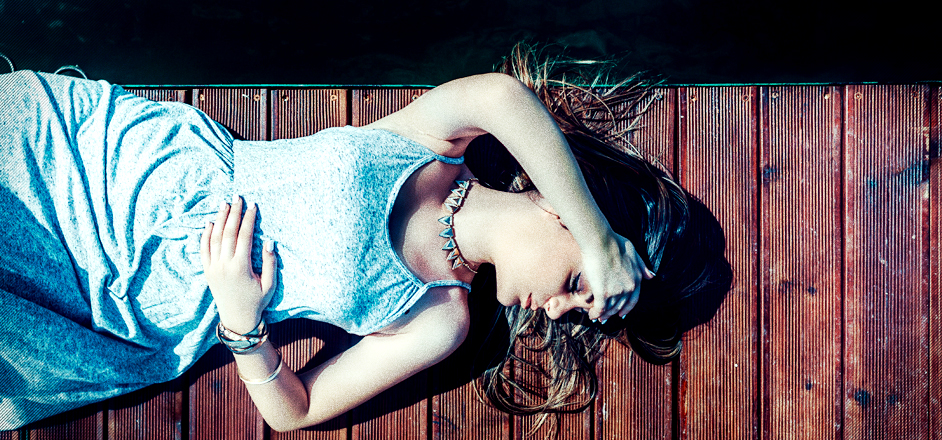Dying might be the last thing you ever do. So why fuck it up? Why go out flailing and crying, drooling and weeping? Why not hire professional help for when foot meets bucket?
That's the pitch from a new breed of self-help gurus who call themselves either Afterlife Coaches or Death Doulas; a growing group of mostly young women who are making a career out of treating death the way midwives or doulas treat birth — as a momentous event, almost worthy of celebration.
There are even schools for it, like the Conscious Dying Institute in Boulder, Colorado, which offers certificates to graduates. There are online classes, including End Of Life University. There are conferences, like one in San Francisco and the one recently held, in Boulder. There are trade organizations. Death: it's so hot right now.
Claire Berjot, for example, wears bright colors with vibrant patterns and radiates life, even though she works in the field of death.
"We do a really good job in our society with birth, with welcoming people into the world, but we do a really poor job of ushering people out," says Berjot, 32.
Doctors, nurses and emergency medical workers notice this all the time. Geriatrics abandoned to wither and rot alone in old folks' homes — while, ironically, surgeons implant pacemakers and insulin pumps to keep them alive longer. And even when young cancer patients are slipping away, if the docs can't fix them they're essentially told: good luck dying! Hope it don't hurt!
There has long been aid for dying people. Priests and monks shuffle and shoo the spirits into heaven. Hospice nurses and volunteers and a nationwide volunteer effort called No One Dies Alone help no one die alone. But Afterlife Coaches and Death Doulas offer a step-up in service, like a luxury concierge for River Styx crossings.
They do all kinds of things.
Before.
Mad at your mother? Never got a chance to visit Rocky Mountain National Park? The coaches can help you tie a neat bow on your life, if they can. That way, you don't die thinking, "I wish I'd told my gardener I loved her begonias!"
During.
In the months leading up to death, the coaches can help you decide whether to take the next cancer treatment or not, to die with tubes in your nose and machines beeping and whirring or quietly in your home. A lot of people keep fighting until they're turning to dust, in part because their children don't want to let them go. But these coaches, like Tina "Kat" Courtney, 41, who works in Las Vegas, often reassure their clients, "It is ok to die. It is ok. Your loved ones are going to be okay." This helps give them permission to do what comes naturally.
"By giving people the freedom to choose death, they can go very very quickly," Courtney says.
Then, when people are "actively dying" — which sounds like an oxymoron — the death coaches set up camp at your deathbed and make sure you don't die alone. They'll wipe up the body and take care of the corpse. They can help arrange the funeral and even do home burials.
After.
And … here's where shit gets weird. A lot of these coaches believe in spirits and souls. And they told me their job is to shepherd the spirit / soul out of the corpse and into the darkness … or the light … or an episode of Ghost Hunters … or whatever the fuck happens after we die.
"Life isn't closed off by walls," says John Davidson, who does this work in New Mexico. "There are doors at either end."
Guiding souls isn't always easy. Davidson says he's had souls that won't leave, loitering like a high school graduate who won't get his own apartment. He thinks these souls, "did not understand that they were supposed to leave." Part of his job is convincing them their lease is up.
But, often, fanning the flames of a belief in an afterlife isn't hard. As humans get closer to death, it's natural to believe more in an afterlife — a lifeboat on a sinking ship. Courtney's website promotes herself as "A Guide to the Other Side."
I asked her: how in the world does she know there's an afterlife? And she told me that she's taken a shitload of drugs. Drinking ayahuasca 1,000 times, she's hallucinated her way into a belief in the afterlife. She's not the only one who's tripped themselves into belief.
"Most of us that are in the work believe that there's something better on the other side. We hear about light. We hear about a warm blissful feeling," says Misa Terral, a Death Doula in Boulder. "Whatever it takes for people to feel better about dying … people are comforted by that." But she's clear to say that, "We don't push our personal beliefs, and we accept whatever the client thinks about death." If an atheist thinks it's just a dirt nap, so be it.
Which brings up the question: how do these guys get paid?
A lot of death doulas charge $100 an hour or so. Berjot says it's on a sliding scale, and the per-hour arrangement falls away during the final hours, so nobody is worried about the meter running.
And Terral admits that payment is a problem. Medicaid won't cover it. Neither will insurance companies. And corpses don't write checks. While some richer people are paying, "most death doulas probably aren't getting paid," Terral says.
There may always be problems with the business model: your customers won't review you on Yelp, you lose a client as soon as you gain one, and there are no repeat customers. But as boomers age and death doulas become a known thing, helping them shuffle off this mortal coil could become more and more of a career option. It's a trend people are dying to look into.




Leave a Reply